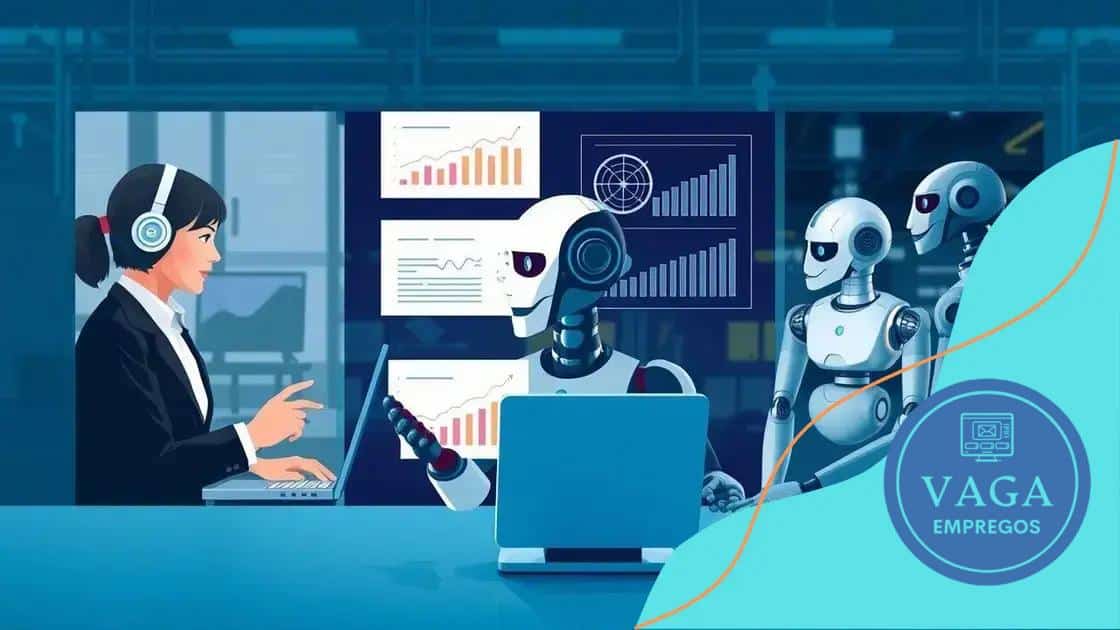Agentic AIs expanding role in automating job functions

Advertisement
Agentic AI’s expanding role in automating job functions transforms workplaces by enhancing collaboration, personalizing work environments, and requiring new skills while emphasizing ethical use and responsibility in decision-making processes.
Agentic AI’s expanding role in automating job functions is changing the way we work. Have you noticed how technology is transforming tasks we once thought needed a human touch? Let’s delve into this fascinating shift.
Advertisement
Understanding agentic AI and its definition
Understanding agentic AI starts with grasping its definition and the implications it has for various industries. This type of AI is designed to take initiative and make decisions, which can significantly enhance productivity and efficiency in job functions.
Advertisement
What is agentic AI?
Agentic AI refers to artificial intelligence systems that can make decisions autonomously. This means they can analyze information, assess risks, and take actions based on those evaluations without constant human oversight.
Key Features of Agentic AI
- Decision-making abilities: Capable of analyzing data and making informed choices.
- Autonomy: Operates independently, reducing the need for human intervention.
- Learning from experiences: Improves performance over time by utilizing feedback.
- Interactivity: Engages with users and other systems to adapt to new information.
This behavior differs greatly from traditional AI, which typically follows programmed instructions. By having the ability to process large volumes of information rapidly, agentic AI can identify patterns and opportunities that humans might overlook.
Another important aspect of agentic AI is its potential impact on the workforce. As industries adopt this technology, job roles may evolve to incorporate AI collaboration instead of replacement. This leads to a shift where workers can focus on more strategic tasks while leaving repetitive functions to AI.
Agentic AI also raises important questions about accountability and ethics. Who is responsible for the decision-making outcomes of an AI? Organizations must develop guidelines to address these challenges.
Key areas where agentic AI automates jobs

There are several key areas where agentic AI is making a significant impact by automating jobs. These areas highlight the efficiency and transformational potential of AI in the workplace.
Customer Service
Agentic AI systems are increasingly used to enhance customer support. Intelligent chatbots can engage with customers 24/7, addressing queries and providing solutions quickly. This not only improves satisfaction but also reduces the workload on human agents, allowing them to focus on complex issues.
Data Analysis
Another critical area is in data analysis. AI tools can sift through vast amounts of data rapidly, extracting trends and insights that would take humans much longer to uncover. This ability to analyze data efficiently helps businesses make informed decisions based on real-time information.
- Predictive analytics: Forecasts trends and customer behavior.
- Automated reporting: Generates reports without manual input.
- Market analysis: Evaluates competition and market position quickly.
In addition to customer service and data analysis, agentic AI is also transforming manufacturing. Robotic systems are increasingly utilized to perform repetitive tasks such as assembly line work. These robots can operate continuously and precisely, enhancing production rates while minimizing human error.
Human Resources
Human resources departments benefit from automation as well. From screening resumes to scheduling interviews, AI can help streamline recruiting processes. This enables HR professionals to spend more time on strategy and employee engagement.
By implementing agentic AI, companies can optimize workflows and enhance productivity across various sectors, resulting in a more efficient workforce. The potential for AI to take over routine tasks empowers employees, allowing them to focus on higher-level strategic initiatives.
Impact of agentic AI on job roles and responsibilities
The impact of agentic AI on job roles and responsibilities is profound and multifaceted. As AI systems take over routine and repetitive tasks, they are reshaping the workforce landscape.
Transformation of Job Roles
One major change is the transformation of job roles. Many positions that require manual input or basic decision-making are evolving. Workers are transitioning from performing tasks to overseeing AI operations, focusing more on strategic thinking.
Increasing Emphasis on Human Skills
With agentic AI taking care of repetitive tasks, there is a growing emphasis on unique human skills. Soft skills such as creativity, empathy, and critical thinking are becoming increasingly valuable. Employees who can harness AI tools to enhance their work are positioned to thrive in this changing environment.
- Collaboration: Teamwork with AI systems to boost productivity.
- Problem-solving: Using creativity to tackle complex issues not solvable by AI.
- Communication: Effectively conveying insights that AI generates to stakeholders.
Additionally, certain roles will become obsolete, while new positions will emerge that focus on managing AI systems. For example, roles in overseeing AI ethics and compliance are becoming crucial. Workers will need to adapt by acquiring new skills and learning how to engage with AI technologies.
The integration of agentic AI also impacts responsibility. Companies must ensure that their AI systems are transparent and fair. Accountability will shift as decisions made by AI need to be explained and justified. This creates a new paradigm where businesses must prioritize ethical considerations alongside efficiency.
As the workforce adjusts, employers are seeking workers who can navigate this evolving landscape. Training programs will play a vital role in preparing employees with skills tailored for this AI-enhanced workforce.
Challenges in integrating agentic AI in workplaces

Integrating agentic AI into workplaces comes with several challenges that organizations must navigate. Addressing these issues is crucial for harnessing the full potential of AI technology while ensuring a smooth transition for employees.
Technical Compatibility
One primary challenge is ensuring technical compatibility. Many businesses use legacy systems that may not readily integrate with new AI technologies. This can lead to additional costs and complexity in implementation.
Workforce Acceptance
Another significant hurdle is workforce acceptance. Employees may fear job loss or feel threatened by AI taking over their tasks. To combat this, organizations must foster a culture that emphasizes collaboration between humans and machines.
- Training programs: Providing education on how to work with AI.
- Clear communication: Explaining the benefits of AI integration.
- Involvement: Engaging employees in the integration process.
Additionally, there are ethical concerns surrounding the use of agentic AI. Companies must establish guidelines to ensure AI systems are used responsibly and fairly. Issues such as data privacy, bias in AI algorithms, and transparency must be addressed to maintain trust among stakeholders.
Another challenge is the cost associated with implementation. While integrating AI can ultimately lead to savings, the initial investment for software, hardware, and training can be substantial. Organizations need to weigh the long-term benefits against these upfront costs.
Finally, ongoing maintenance and updates are vital to ensure that AI systems continue to function effectively. As technology advances, AI systems may require frequent adjustments to stay relevant and efficient. This adds another layer of complexity to the integration process.
Future trends of agentic AI in employment
The future of agentic AI in employment is promising and full of potential. As technology continues to evolve, several trends are emerging that will shape how businesses operate and how employees interact with AI.
Collaboration between Humans and AI
One significant trend is the increased collaboration between humans and AI. Rather than replacing jobs, agentic AI will augment human capabilities. This shift means that employees will work alongside AI systems to enhance productivity and creativity.
Personalized Work Environments
Another trend is the development of personalized work environments. AI can analyze individual employee performance and preferences, allowing companies to tailor work processes to each person. This customization can lead to improved job satisfaction and efficiency.
- Flexible roles: Job responsibilities may shift based on AI recommendations.
- Enhanced training: Ongoing learning will be necessary to keep pace with AI advancements.
- Virtual assistance: AI may provide real-time support for decision-making.
As businesses adopt agentic AI, we will also see a rise in demand for new skill sets. Employees will need to adapt to using AI tools effectively, which may require reskilling and upskilling initiatives. Organizations that prioritize employee development will likely gain a competitive edge.
Focus on Ethics and Accountability
Furthermore, ethical considerations will play a vital role in the future of agentic AI in the workplace. Companies must ensure that AI systems are transparent and do not perpetuate biases. This focus on ethics will foster trust between employees and employers.
In light of these trends, a collaborative approach to integrating agentic AI into the workforce will be essential. As technology continues to advance, the relationship between AI and employees will evolve, promoting a more innovative and adaptable work environment.
FAQ – Frequently Asked Questions about Agentic AI in the Workplace
How does agentic AI improve collaboration in the workplace?
Agentic AI enhances collaboration by automating repetitive tasks, allowing employees to focus on more strategic and creative efforts alongside AI tools.
What skills will employees need to work effectively with agentic AI?
Employees will need to develop skills in data analysis, AI tool usage, and critical thinking to effectively collaborate with AI systems.
How can organizations ensure ethical use of agentic AI?
Organizations can establish guidelines for transparency, monitor AI decision-making for biases, and involve diverse teams to oversee AI implementation.
What does the future hold for jobs with the rise of agentic AI?
The future will likely see a shift where jobs evolve to include AI oversight and management, emphasizing unique human skills that AI cannot replicate.





